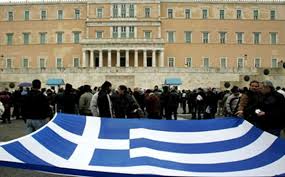By Michael Booth, American Thinker
I’m giving a short (four session, 6 hour) seminar this month on assorted financial topics. The venue is the SAIL program at Collin College in my hometown of Plano, Texas. The topics to be discussed are chosen by the participants, from whom I’ve elicited questions and comments. My favorite question so far is “why should I care about Greece?”
The answer has several parts; political, economic, ideological and perhaps — given Greece’s history — even philosophic, all blended together into an acrid, ruinous stew.
Greece is routinely painted in the Western MSM as the feckless child, and over the decades there’s truth in this. The Greeks are the author of their current situation. But that history of economic fantasy changed in the last Greek election, with the empowerment of a reality-based coalition.
The new government wants to recognize the obvious. They want to declare Greece bankrupt and default on 50% of their massive sovereign debt… which is rational given that the country is not only bankrupt but completely illiquid and totally insolvent. (Their debt should be 100% defaulted IMHO but whatever.)
The rest of the EU, led by Germany, wants to pretend all is well, have the Greeks borrow yet more money to pay interest on the mountain of existing debt thus adding to it, and extend maturities for the principle payments coming due into the far, dark, distant future. This is known in reality-based circles as “extend and pretend”. Younger readers might think of it as the “Voldemort Strategy”: never saying what must not be spoken of.
Extend and pretend is the official policy of Europe, for fear that a dozen more countries of the EU are illiquid and insolvent as well, that they might be tempted to default if the Greeks do, and that the entire EU house of cards would collapse if anyone dares say out loud and act upon what everyone already knows is true. So Orwellian exchanges like this take place daily, as reported on ZeroHedge.com on March 12th:
The Greco-Germanic war of words continues… Having pissed off The Greeks with his “Troika” remarks, Germany’s Finance Minister Schaeuble went on today to more ad hominem attacks by reportedly calling the Greek Finance Minister Varoufakis “foolishly naive.” The Greek ambassador has ‘officially’ complained to “friend and ally” Germany about the personal insult. But The Greeks had the last laugh, as first Varoufakis and then Greek Prime Minister Tsipras explained respectively that “Greece would never pay back its debts,” and “Greece cannot pretend its debt burden is sustainable.” The German response, via tabloid Bild: “there must be an end to this madness. Europe must not be made to look stupid.”
Then there’s this trap door under the Euro, showing clearly that the oncoming political floundering about will be fully reflected in the currency. This also from ZeroHedge.com on March 12th. FYI, the Euro opened in NY on Friday, March 13th, at $US1.0518.
“Although the market seems obsessed with the euro/dollar parity, SoGen’s Technical Analysis guru Stephanie Aymes stresses that it is the $1.05/1.04 level that is more important, being the lower limit of the EUR/USD’s massive upward channel since 2000. Stephanie argues that the move since last summer has been relentless and is very similar to the one seen in the late 1990s. She suspects that a break below $1.05/1.04 will confirm that the ongoing move is not a correction of the up move since 2000, but a much larger down move. In such a scenario, the EUR/USD will achieve parity, but this may well be just a temporary support before the down leg extends towards $0.98/0.96 – and even perhaps towards the lows of $0.84/0.82 reached in 2000.”
May I suggest a general theorem: that any political system balanced on an economic absurdity is at best politically precarious, and at worst economically delusional and self-destructive. And that delusional economics and precarious politics can easily lead to mind-numbing, grossly confiscatory ‘solutions’.
May I suggest a general theorem: that any political system balanced on an economic absurdity is at best politically precarious, and at worst economically delusional and self-destructive. And that delusional economics and precarious politics can easily lead to mind-numbing, grossly confiscatory ‘solutions’.
On March 10th the Greeks and Europeans met to solve the immediate cash deficiency the Greeks face, with interest payments due on their debt and no money to pay them. The Greek government had already set in motion the confiscation of all the money in nominally independent, sacrosanct private Greek pension funds by demanding all assets in those funds to be converted to sovereign debt. This was smilingly approved of by the IMF, ECB, and Brussels EU bureaucracy. But this EU trio, “The Troika”, had another suggestion, also on ZeroHedge.com, March 13th:
The Greek media is ablaze with just what Europe’s proposed solution to this issue may be. As Protothema and Capital report, the Troika proposed that Athens halt the payment of salaries and pensions for one to two months. This, according to Europe, would promptly tackle the problem of liquidity and find a solution to Greek problems of how to pay back bailout loan tranches to creditors when suffering from liquidity problems.
Now, back to the question at hand: “why should I care about Greece?” Because — I would propose as a corollary to that general theorem above — any government being crushed by sovereign debt in sums too large to ever be repaid, and facing unrelenting illiquidity from insupportably large interest payments it can only borrow to cover, will act precisely as the Greeks have reacted.
We should care about Greece as an object lesson. All Western democracies, without exception and including our own, are traveling down the same road Greece has traversed, headed sooner or later into the same financial box canyon in which Greece now finds itself.
The choice, no matter how long delayed, finally becomes confiscation or default. “Extend and pretend” is not a valid, long-term solution. Pretending bankrupt nations are healthy is always, ultimately delusional and self-destructive. Such attempts to prolong the inevitable are not signs of political wisdom but sure signs of political exhaustion.
Perhaps a large fish on a deep blue field would be a better flag for the EU than the one they use now.



















